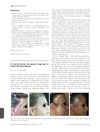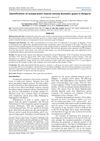 August 2007 in “CRC Press eBooks”
August 2007 in “CRC Press eBooks” Hair loss is mainly caused by a testosterone byproduct, and hair restoration surgery uses hair from the back and sides of the scalp.
 June 2007 in “CRC Press eBooks”
June 2007 in “CRC Press eBooks” Hair transplants have improved to use smaller, more natural-looking hair grafts.
 January 2007 in “Inpharma Weekly”
January 2007 in “Inpharma Weekly” Dutasteride is more effective for male pattern baldness than finasteride, and black cohosh extract BNO 1055 is as effective as conjugated estrogens in treating postmenopausal symptoms, with added benefits in reducing sweating and mental symptoms.
 164 citations,
April 2008 in “Cochrane library”
164 citations,
April 2008 in “Cochrane library” Current treatments for alopecia show no significant long-term benefits.
 126 citations,
April 2006 in “International Journal of Dermatology”
126 citations,
April 2006 in “International Journal of Dermatology” The conclusion is that FFA and LPP have similar scalp biopsy features, making them hard to distinguish histologically, and FFA may be a specific kind of scarring hair loss.
 53 citations,
February 2017 in “Journal of The American Academy of Dermatology”
53 citations,
February 2017 in “Journal of The American Academy of Dermatology” The conclusion is that high-potency steroids or tacrolimus are effective treatments for erosive pustular dermatosis of the scalp.
 39 citations,
July 2015 in “British Journal of Dermatology”
39 citations,
July 2015 in “British Journal of Dermatology” The pseudo 'fringe sign' can also appear in frontal fibrosing alopecia, not just in traction alopecia, showing that this condition may be more common than thought.
 32 citations,
November 2004 in “Journal of pharmaceutical sciences”
32 citations,
November 2004 in “Journal of pharmaceutical sciences” Different tea tree oil mixtures absorb into hair follicles at varying levels, with microemulsion being the most effective.
 32 citations,
October 2004 in “Pharmacotherapy”
32 citations,
October 2004 in “Pharmacotherapy” Peginterferon alfa-2b and ribavirin therapy for hepatitis C can cause serious side effects, some different from those reported in clinical trials.
 21 citations,
January 2014 in “Dermatology Research and Practice”
21 citations,
January 2014 in “Dermatology Research and Practice” Hair and serum levels of zinc, copper, and iron are similar in people with alopecia areata and healthy individuals.
 20 citations,
March 1994 in “Clinical and Experimental Dermatology”
20 citations,
March 1994 in “Clinical and Experimental Dermatology” Too much topical minoxidil can cause excessive hair growth, but stopping treatment reverses it.
 19 citations,
January 1997 in “Endocrinology”
19 citations,
January 1997 in “Endocrinology” Testosterone can slow hair growth in adult monkeys, but a blocker called RU 58841 can counteract this and potentially help hair regrow.
13 citations,
October 2016 in “Journal of Clinical Neuroscience” Thallium poisoning can cause worsening nerve damage and vision loss without typical symptoms.
 13 citations,
April 2009 in “Acta Medica Scandinavica”
13 citations,
April 2009 in “Acta Medica Scandinavica” Minoxidil lowers blood pressure and causes hair growth, with some side effects.
10 citations,
November 2019 in “Journal of the European Academy of Dermatology and Venereology” The RAS pathway affects hair growth differently in CFCS and CS.
 9 citations,
January 2019 in “Skin appendage disorders”
9 citations,
January 2019 in “Skin appendage disorders” Researchers found a new sign of fungal infection in some patients with Seborrheic Dermatitis.
 6 citations,
November 1996 in “Archives of Dermatology”
6 citations,
November 1996 in “Archives of Dermatology” G-CSF effectively treated a teenager's cyclic neutropenia and reduced her symptoms without adverse effects.
3 citations,
February 2021 in “Pediatric rheumatology online journal” A girl with lupus and trisomy X has a higher risk of bone problems like avascular necrosis and osteoporosis.
3 citations,
February 2014 in “Anadolu psikiyatri dergisi” A teenager's hair loss was caused by the drug quetiapine but improved after stopping the medication.
 2 citations,
November 2022 in “Skin research and technology”
2 citations,
November 2022 in “Skin research and technology” 5% topical minoxidil improves hair density and quality in monilethrix patients.
 2 citations,
January 2008 in “Journal of Pakistan Association of Dermatology”
2 citations,
January 2008 in “Journal of Pakistan Association of Dermatology” Finasteride 1mg daily effectively increases hair growth and slows hair loss in men with male pattern baldness over two years.
 1 citations,
June 2023 in “BMC Pediatrics”
1 citations,
June 2023 in “BMC Pediatrics” Most children recovered from COVID-19 in 4 weeks, but some experienced long-term symptoms, especially older kids.
August 2024 in “Nutrients” Probiotics help reduce hair loss and increase hair growth in people with androgenic alopecia.
 January 2024 in “Estetologia Medyczna i Kosmetologia”
January 2024 in “Estetologia Medyczna i Kosmetologia” Most hair loss shampoos have unproven active ingredients.
 November 2023 in “Curēus”
November 2023 in “Curēus” Topical tretinoin effectively treated sebaceous filaments, improving skin appearance.
 April 2023 in “Veterinary world/Veterinary World”
April 2023 in “Veterinary world/Veterinary World” Six types of bugs were found on goats in Bulgaria, with Linognathus stenopsis being the most common.
 January 2023 in “Journal of The American Academy of Dermatology”
January 2023 in “Journal of The American Academy of Dermatology” Baricitinib helped most teenagers with severe hair loss regrow hair and had mild side effects.
December 2022 in “The Turkish Journal of Pediatrics” Hair examination helps diagnose rare neurological diseases in children.
September 2021 in “Journal of pharmaceutical research international” The conclusion is that hirsutism is strongly linked to PCOS and higher levels of certain hormones, but not to DHEAS, prolactin, cortisol, or TSH.
 December 2020 in “bioRxiv (Cold Spring Harbor Laboratory)”
December 2020 in “bioRxiv (Cold Spring Harbor Laboratory)” Stress can cause a type of hair loss in mice lacking the CCHCR1 gene.























